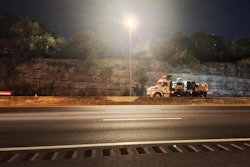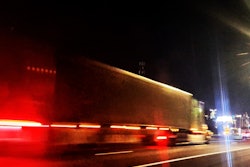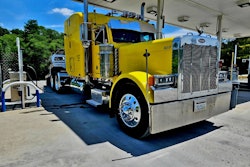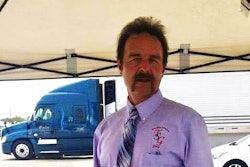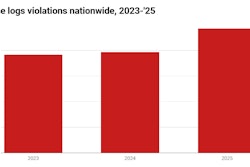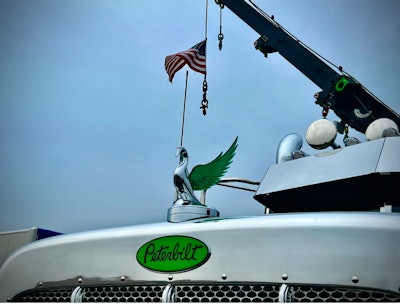
Ever wonder who the trucker is who raises the American flag from his 50-ton rotator at the Mid-America Trucking Show, Large Cars and Guitars or the Walcott Truckers Jamboree at Iowa 80 Truck Stop? That’s Clifton Parsley. A recent winner of the Working Truck Specialty class at Walcott, Mr. Parsley and his wife, Joyce, have taken on an ad hoc role as advocates for the towing industry with their many friendly interactions at truck shows around the country.
And as much coverage as we’ve seen regarding predatory towing practices, I thought it was high time to hear from one of the good guys. In a world where boot-hungry marauders and bad actors charging $500,000 for cargo clean-ups tend to dominate towing headlines, Overdrive editor Todd Dills' July 4 story regarding egregious practices within the towing industry started out with a recognition of broader reality.
The story quoted Moseley Marcinak attorney Martin E. Cain, who duly noted that the “vast majority of towing companies out there are honest folks just trying to make a living.”
Just what is it like earning a living in towing these days?
 Bringing home the iron in Walcott: The Parsleys (pictured here) and their 2024 "Heavy Hook" Peterbilt 389 won trophies for Working Truck Specialty, Polish and Appearance, as well as and Custom Vinyl, at this year’s Walcott Truckers Jamboree.
Bringing home the iron in Walcott: The Parsleys (pictured here) and their 2024 "Heavy Hook" Peterbilt 389 won trophies for Working Truck Specialty, Polish and Appearance, as well as and Custom Vinyl, at this year’s Walcott Truckers Jamboree.

“We started the business back in 1999 with a garage and one rollback," Clifton said. "We’re up now to five heavy wreckers. We have two rotators, and we take trucks all over the country.”
His newest piece of equipment is a 50-ton rotator, that "Heavy Hook" 2024 Peterbilt 389, with a 565 Cummins and an 18 speed.
The price tag? Just shy of a cool million.
 The "Heavy Hook" 2024 Peterbilt 389
The "Heavy Hook" 2024 Peterbilt 389
Owning a piece of equipment with a rotating boom also confers logistical advantages to the motoring public, as he put it: “You don’t have to move your truck around three or four times and reposition it. It moves around for you. We only have to block one lane of the highway. Lot of times you just have to block the slow lane and keep traffic flowing so you don’t have to shut down the whole interstate, so it’s a great advantage to us for that."
State police require a rotator for anything "extremely heavy, or even a burnt truck," he added. "We can lift that burnt truck and put it on a Landoll trailer and haul it in because, of course, most of the time it burns all the tires on the truck [and] there’s no way to tow it.”
With nearly a million tied up in just one piece of equipment and all the return on investment pressure that creates, the toxic cocktail of inadequate insurance with inexperienced drivers have left the Parsleys holding the bag on some major tows where multiple assets were deployed.
“There’s a lot of drivers that [don't] have a lot of experience now," Clifton said. "And when you put them behind the wheel with 80,000 pounds going 70, 80 miles an hour, that’s a great combination for things to happen.”
And what about those messy cargo clean-ups?
“Anytime cargo’s involved, you’re dealing with an insurance company," Clifton said. "We can deal with three different insurance companies" for just a single wrecked unit. "The truck could have one insurance company, the trailer could have another insurance company, and the cargo is another company you’re dealing with."
[Related: FTC's 'junk fees' rule could protect trucking from predatory towing?]
He told the story of a particular load of eggs that stood out: "That's a memorable one. They were in these big crates. They were going to these big-box stores, and it was just a huge mess. There was egg everywhere. After a few days of having that at [our] lot, it gets pretty smelly. A trailer full of broken eggs that just sits there for two weeks is a big problem. [The insurance company] is trying to determine, ‘Well is this 40 percent our fault? Is this 30 percent our fault?’ So they kind of fight that out and that can take a month to deal with.”
Meanwhile, it’s Joyce Parsley who winds up wrangling all the paperwork with the multiple insurance companies. And sometimes, when trucks and trailers are totaled, things get interesting.
“There was a whole trailer that was completely lost,” she said. “Downy products. Febreze products. It looked like somebody just cut the trailer open and it just ground it all the way into the dirt." Parsley disposed of the product, she added, yet the trailer and the truck remained. "Like he said, that was one of those where you had [different] insurance for the truck, insurance for the trailer, insurance for the cargo."
And not enough insurance on the trailer nor the truck to cover damages. "It was like a $5,000 dollar limit," she said. "The only thing they had [fully] covered was the cargo we’d gotten rid of. Big loss. We had three rolloffs out there. We actually had a friend who was good with us. He brought one of his pieces of equipment out there to help us dispose of everything, to fix the dirt, to fix the grass back.”
All for about $5,000.
Re-reading this story over coffee before sending it in, I wondered whether these nightmare scenarios for the tow company are in part driven by the power only model -- one trucking company responsible for the truck and liability insurance, potential another company or brokerage or two for the trailer's damage, variations on the cargo insurance.
For Clifton Parsley, after Joyce pays the employees their 30%, the towing service goes in the hole for fuel, equipment and more for a job requiring three recovery vehicles and extensive ground reclamation. Remember, both truck and trailer were a total loss in the example Joyce shared, so there’s no impound leverage they can exert.
Could inadequate insurance, coupled with the power only model increasingly employed by big brokers and shippers like Amazon, with the cost of liability insurance borne by one-truck owner-operators and other small fleets with limited resources. ... Could that be driving up fees for towing? In the towing-focused research report from the American Transportation Research Institute, published in 2023, more than 80% of carriers surveyed reported being burned by a towing company. While that sure sounds like more than just a few bad actors, is there something more endemic going on here?
If you’re a trucking company with a $5,000 towing rider on your policy and the bill is $30,000 to extract your truck from a ravine, you haggle and harangue the tower, get him to knock a couple thousand off, and pay the $23K. Then you call your insurance man on Monday for a price on more towing insurance. If you have a leased owner-operator working for you, and that’s her truck in the ravine, you pay her bill, then you charge her and set up a payment plan if need be.
But if you're a one-truck power only independent with a $5,000 towing rider and about $9,000 in the bank, you better hope your truck is totaled, because it’s impound time, no way to get it back without borrowing.
Is this the reason tow bills seem almost universally outrageous? The same reason that hospital bills are high? Are we living in a system that's hopelessly bifurcated, and the folks with assets are paying for those without?
[Related: Tow company defends 'predatory' practices]
'Say a little prayer for those people and go do your job'
Talking with the Parsleys reminded me of a long conversation I had back in the 1980s with a wrecker operator. Once, during a long tow from Chicago back to Indiana, I asked him what the whole attraction was with doing recovery work at crash sites. He had certainly been fond of talking about his many calls during our trip.
He confessed he was addicted to the adrenaline rush that came from the chaos of it all, and knowing that it was his job to restore order.
I asked Clifton if that was really a thing.
"It is very addicting," he said. "You’re not doing the same thing over and over again. No wreck is the same. No two recoveries are the same. We work a lot of fatalities where people [have] burnt-up in trucks. It’s not for the faint of heart. You have to work along with it. We work along with the fire department sometimes pulling the cabs apart so they can go in there and get people, and those people may be deceased."
It has to be done before the equipment can leave the accident scene.
"That’s not the pretty part of towing," he said. "But it’s something we have to do. So you try to put that behind you, say a little prayer for those people and go do your job."
More in Long Haul Paul's "Faces of the Road" series of profiles and oral histories.
[Related: Beating predatory truck tows -- the Partners in Business guide]

